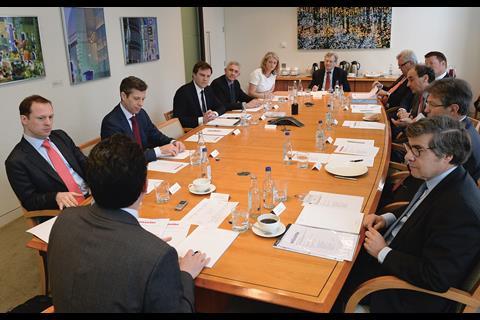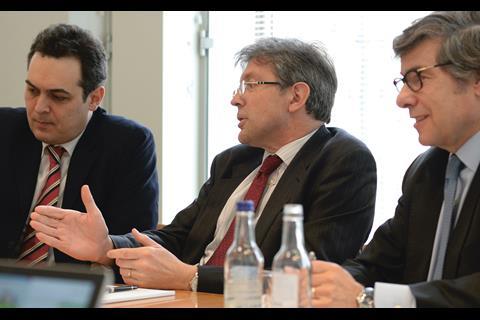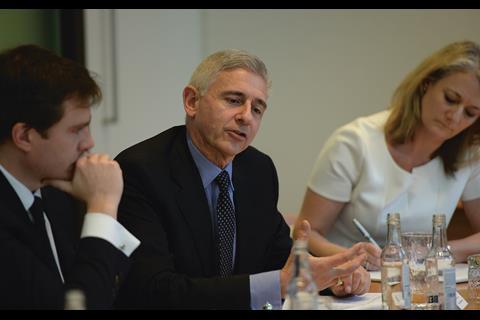London is the world’s most popular seat for international arbitrations. Time to celebrate its dominance – or counsel against complacency? Eduardo Reyes reports from the latest Gazette roundtable.
It is something of a challenge to bring together the great and the good of the arbitration world. The Gazette’s roundtable on the influence of English law on arbitrations was first conceived almost two years ago.
The practical problem of getting everyone in one room is indicative of the nature of modern arbitrations – so successful are London’s counsel for arbitrations that QCs and partners at City and international law firms spend a hefty proportion of their time travelling to and from arbitrations in other jurisdictions.
The talk over coffee and breakfast is of airports, flights and engagements in multiple jurisdictions. One attendee provides updates on delayed progress in reaching the roundtable from the country they woke up in – another is an ethereal presence speaking from a phone placed between the other attendees. If the arbitration community can at times feel like a bit of a club, it is one where the members often meet as they pass in opposite directions at airport arrival and departure lounges.
On one level, this is part of what makes London’s dispute resolution capabilities the ideal export – a high-end ‘product’, reinforcing the capital’s status at the centre of global commerce and the professions. It is, according to the research available, the arbitral seat of choice for around a third of general counsel in international companies. Our capital city is three times more popular than second-placed Geneva.
Essentially, this roundtable considered whether London, English arbitrators and some counsel are at risk of succumbing to complacency, if not hubris.
Paradoxically, the Gazette wants to know if English arbitrators, and by extension the English influence on arbitral proceedings, are, in fact, sufficiently international.
Nasty surprises
Covington partner Jeremy Wilson opens by setting out the proposition: ‘Are English arbitrators sufficiently international when setting out the procedure for international arbitrations seated in London, or is there a default inclination to apply, and perhaps reluctance to depart from, English court procedures? If so, is this an issue?’
‘English arbitrators may be the best in the world,’ Wilson’s fellow Covington partner Stephen Bond posits, ‘but have a tendency to use English court procedures as the default. Civil law arbitrators never mention their own codes.’
Poor familiarity with English procedural rules might place a represented party at a disadvantage in such circumstances. For the unaware, it has been suggested in a previous forum, English court procedures contain ‘nasty surprises’. There are implications here for both the length and cost of the dispute.
‘It’s certainly not in every case, and it’s not all the time,’ Bond is keen to stress. But when the arbitration takes on some of the accepted norms of the Civil Procedure Rules (CPR), there are clear consequences. This starts with establishing a procedural calendar, and involves an ‘exchange of facts’ that precedes a discussion about the law on which the claims are based. There is the need to submit CPR-style skeleton arguments (‘a purely English concept’, Bond points out). The use of bundles, and within the arbitration the cross-examination of witnesses, also reflects the adoption of English rules and assumptions.
This is all in contrast to the ‘memorial’ system which in spirit more closely matches aspects of civil law disputes. Under the memorial, or ‘all in’ system, discussions about the relevant laws for the claim are held closer to the start of the arbitral process, and witness evidence is also submitted at the outset. In other words, the parties have been impelled to gather the information that their case relies on – and the case on each side is presented as a block.
Northrop Grumman’s former European legal chief Wolf Juergen von Kumberg prefers to dwell on the client’s perspective. The bigger question, he says, is: ‘Is the arbitrator suitable for the case?’
‘That is the key, not the procedures,’ he argues.
The question of the arbitrator’s background and assumptions is relevant, von Kumberg notes, only insofar as ‘we bring our backgrounds into the procedure. The key thing from a client perspective is the right to select the tribunal – does the case have the right arbitrators?’
‘Are they internationally minded?’ is the way Gibson, Dunn & Crutcher partner Cyrus Benson looks at the question. Benson distinguishes between the mindset of ‘retired English judges’ accepting appointments as arbitrators, and those whose arbitration experience has been gained acting as counsel in international arbitrations. An insufficiently international approach is ‘not unique to England’ he adds: ‘In the US you can get the same parochial approach.’ That is an accurate picture of arbitrations across the US, confirms GE’s Michael McIlwrath.
Nicholas Fletcher QC, barrister at 4 New Square, recognises the phenomenon of the retired judge who sets out to conduct an arbitration with something like ‘High Court procedure’, whereas: ‘Arbitrators, at the end of the day, should listen to the parties.’
Rights to choose
Care over the choice of arbitrator is not to be neglected, then. As Pendell stresses: ‘That is the parties’ right.’ Boies, Schiller & Flexner’s Wendy Miles QC notes some commonalities in arbitrations where English-style court procedures have been adopted.
‘When I see English procedures,’ she says, ‘I often see two factors. There are English representatives on both sides – and the arbitration is under LCIA [London Court of International Arbitration] rules. I’ve never heard a rationale for simply adopting English court procedures.’
At the table
Guy Pendell, CMS Cameron McKenna; Cyrus Benson, Gibson, Dunn & Crutcher; Jeremy Wilson, Covington & Burling; Wolf Juergen von Kumberg, Northrop Grumman; Wendy Miles QC, Boies, Schiller & Flexner; Stephen Bond, Covington & Burling; Dr Wolfgang Peter, Python & Peter; Christopher Harris, 3 Verulam Buildings; Richard Jacobs QC, Essex Court Chambers; Elmar Schweers, RWE; Nicholas Fletcher QC, 4 New Square; Eric Schwartz, King & Spalding; Eduardo Reyes, Law Society Gazette; Michael McIlwrath, GE (via phone)
National jurisdictional assumptions are not the only ‘background’ factor affecting the conduct of arbitrations, Dr Wolfgang Peter, of Python & Peter, believes. ‘Arbitrators tend to have a litigation background,’ he points out. ‘I came to this as a corporate lawyer,’ he says, and from that perspective it appears that ‘some of the evidence rules are produced by what are leading questions’.
Christopher Harris of 3 Verulam Buildings acknowledges ‘an established culture that everyone buys into’. But, Harris insists: ‘Things are changing. More lawyers have now grown up in firms that have a specialised arbitration practice.’
‘There’s been quite a lot of change in the last 15 to 20 years,’ Essex Court’s Richard Jacobs QC interjects. But one still has to guard against a range of default assumptions, he suggests: ‘When you have arbitrations under different rules, be careful about whether people will assume foreign law is the same as English.’
Room for manoeuvre
The discussion turns to the ways in which the IBA rules on taking evidence are used, and it is clear that there is a relationship between jurisdictions related to the dispute and the use of the rules. King & Spalding partner Eric Schwartz explains: ‘The IBA [rules] are applied everywhere, but they are applied in a different way here and in Geneva.’ Variations, reflecting such factors as jurisdictional difference, include ‘the burden of proof and the effect on document production’.
Use of the IBA rules can be adapted at will to provide a ‘hybrid’ process. As Miles notes: ‘You can get a common law approach with civil law modifications. It could equally be said that you have arbitrations where civil law is applied with common law modifications, whereby you only have obligation for document production if it is needed on a narrow issue.’
London traffic
The London Court of International Arbitration in Fleet Street received a record number of referrals in 2013, the latest year for which figures are available. Some 290 arbitrations were referred, in addition to 11 requests for mediation or some other form of alternative dispute resolution.
The nature of contracts from which referrals arose was diverse and included agreements relating to: mining; labour services; offshore energy; construction; shipbuilding; and telecoms.
The oil and gas industry was the most active, generating 15% of all referrals in 2013.
Typically, over 80% of parties in pending LCIA cases are not of English nationality.
‘It’s a tiny document of rules,’ she adds. So are clients over-reliant on counsel to guide them to the best process? ‘It depends on the client,’ von Kumberg says. ‘We are sophisticated clients. But some rely very heavily on counsel.’
On the selection of arbitrators, von Kumberg warns nationality is not a good guide: ‘When it comes to the selection of an arbitrator, it comes down more to individuals.’
A mistaken choice of arbitrator, Harris notes, can give rise to a scenario where, for example, ‘the tribunal wants more time to hear witnesses than the parties do’.
The relationship of the arbitration to national jurisdictions does, however, need to be recognised, because jurisdiction will affect the different document and commercial practices of the parties.
Fletcher explains: ‘On document production, if you run a business where all disputes will be in the French courts, you get a record in writing because you know there is no disclosure. If you usually deal in common law for disputes you will be more relaxed as you know you can rely on witness testimony.’
‘You can make a generalisation,’ McIlwrath suggests. ‘Say, my business’s disputes are document-based, so Paris and Geneva are our favourite jurisdictions. Being able to select those jurisdictions may make disputes less time-consuming for us and mean shorter hearings.’
This is a leading consideration, Peter suggests: ‘Will it be done in an efficient way?’ It is a question a good arbitrator needs to engage with, he adds: ‘If the arbitrators are sufficiently international, they will look at all the features – length of the process, document production and so on – and discuss with counsel for both parties.’
Such considered discussions, led by ‘sufficiently international’ arbitrators may still encounter dividing lines that exist over procedure. Bond argues: ‘If we have to generalise, I can’t imagine a situation where law shouldn’t be presented up front. It shapes the facts and the documents we search for.’
Fletcher suggests there are ways through such an impasse: ‘Because we use a customised English procedure, you don’t ignore the law entirely. You are making out a legal basis for the case, but without the authorities.’ A memorial process has its inefficiencies, he adds, tending at times to produce ‘an amorphous mass’.
Miles suggests that law governing the relevant contract and preferences over the procedural efficiency of the arbitration are not the only considerations when appointing an arbitrator and agreeing procedures. ‘We talked about if English law governs the contract, then is [that] a case for appointing an English [law] arbitrator. But, you also need to look at the place of engagement. If it is Ruritania, then there is a case for appointing a Ruritanian lawyer as an arbitrator.’
The advantage of such an appointment can relate to the relationship between the arbitration process and the national courts that are expected to enforce the decision – and to a greater understanding the arbitrator might have of the commercial context of the business arrangements in which the dispute has arisen.
Others note that the assumption that common-law procedural norms do not always lengthen disputes. On document production and disclosure, which come first in the common law tradition, Peter notes: ‘US counsel often insist.’ The argument, he says, runs thus: ‘We don’t know we have a claim until we have document production. You should start an arbitration convinced you have a case.’
Concerns about the proportionality of common-law costs persist notwithstanding. Proportionality is an area that the International Chamber of Commerce has sought to address, Miles points out, whereby conduct by a party in a dispute – such as unreasonable disclosure demands – means the party can be penalised by a ‘new costs sanctioning power’.
The distinctions highlighted can reduce somewhat, Schwartz notes, depending on the nature of the dispute: ‘The kinds of cases I sit in are fact-driven. The legal principles are not in dispute, mostly. It’s the facts that are in dispute.’
‘People are wary of disclosure exercises,’ relates RWE’s Elmar Schweers, relating the common mindset among German clients. ‘But disclosure is creeping in.’
Too cosy?
Where arbitration falls short of the parties’ needs, its faults go deeper than the merely presentational. Where a party that is not using an English QC views a tribunal where various other parties have fielded a total of five QCs, and the arbitration is before a QC – all might be from the same chambers – the setup, atmosphere and proceedings can seem a little ‘cosy’, it’s true.
Add in a preference from most present for procedures based on the CPR and the impression is complete. It certainly does not appear that the default mode for such an arbitration is ‘international’. But as Schwartz concludes: ‘I’ve sat in many a tribunal when [I was] the only American in the room, but not sensed that’s affected things. Other than when a procedural point comes up.’
Better communication may also help, Fletcher suggests: ‘We should be positive about it – saying “yes we are sufficiently international”. As “pure international arbitrators”, there are a whole range of tools we can utilise for the parties.’
Arbitration as a dispute resolution option would be more satisfactory, Peter concludes, if more arbitrators were a known quantity at the stage where they are appointed. The market for known arbitrators is ‘too narrow’ he argues. ‘The problem is a lack of transparency in the market,’ he says. ‘We don’t have enough information. Arbitrators can seem to tick all the boxes, but you have to look out for their peculiarities.’
Eduardo Reyes is Gazette features editor
- This roundtable was kindly hosted by Covington’s London office


































1 Reader's comment